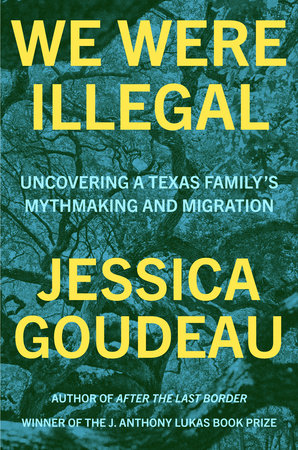READERS GUIDE
WE WERE ILLEGAL by Jessica Goudeau – Reader’s Group Questions
1. What do you think about the book’s title? What does the word “illegal” usually mean when we talk about immigration? How does Goudeau make us think differently about the word in the past and today?
2. In her writing and research, Goudeau wrestles with her own family myths, even when it makes her uncomfortable. What kinds of stories from your own family make you uneasy? Have you confronted any of these narratives yourself? Who in your family do you admire for the kind of moral courage Goudeau is striving for?
3. In telling the story of Sally Reese, Goudeau has abig realization: that she wants to “carve the letters deeply,” or tell the stories of others in a way that ensures that people often left out of the frame of history are not forgotten. What did you admire about Sally Reese, and what is complicated about her story when we look back at it now? How do you see the effects of Sally’s life across the generations? How can you “carve the letters deeply” in telling the stories of others in your own life?
4. Robert Leftwich fled to Texas to avoid his debts and failures. By looking at Polly and her family, Goudeau shows how Robert’s actions and self-focus impact the people he enslaved. Whose lives are often unthinkingly centered in our history and policies? Whose rights do we often think of as “violable,” meaning they can be displaced or have their rights taken away or even made more uncomfortable by laws and societal worldviews?
5. Goudeau compares the violence of the Battle of Goliad, when Perry Reese died, with the violence of the Dressing Point Massacre, when Karankawa families were slaughtered. Both are stories of large groups of people being murdered by soldiers without weapons to defend themselves, but the way they’ve been remembered in history is very different. What do you think about that comparison? How did those stories make you think differently about the act of mythmaking, and the writing of history, in a place like Texas? How did they make you think about violence today?
6. How does the story of Sam Houston Reese reflect the difficulties of historical records? With three different perspectives from Lillie Reese, James Kearney, and Goep, how does the truth reveal itself? How do we decide what the truth is?
7. In history, it’s easy to see the influence of the Ku Klux Klan in big ways, but harder to trace the quiet effect of racism on societies, neighborhoods, churches, and schools. How did you connect to the story of J.C. Reese? Goudeau is clear about the ways her great-grandfather’s actions benefited her: is it enough to write about it, or could she do more? What do you think about the changing generational views in Goudeau’s family, and what does that look like in your own life?
8. There’s no question that what Vail Ennis did in murdering innocent people was horrible. But Goudeau is explicit that there was a cost to Frank Probst’s decisions to cover up crimes and to ignore the deep wrong in his own family. Why do you think Frank got away with his behavior in his own time? How does that guilt, pain, and shame echo to this day?
9. Is it enough to let people be “of their time,” or can we expect more of them when we look back from the vantage point of today? How do you wrestle with this in your own life—both looking at the past and looking ahead to the future? What do you hope future generations say about you?
10. When she’s afraid of writing this book, Goudeau’s mom tells her: “I don’t want you to be discouraged, Jess. Just because it’s hard doesn’t mean it’s not worth doing.” What would you change if someone gave you the permission you needed to face the hard things in your own life? Why might you feel like you need permission?

